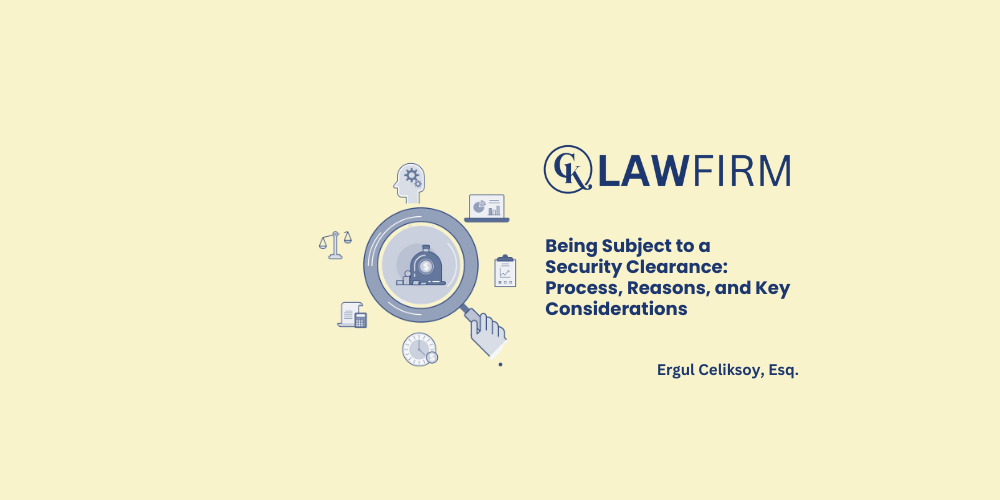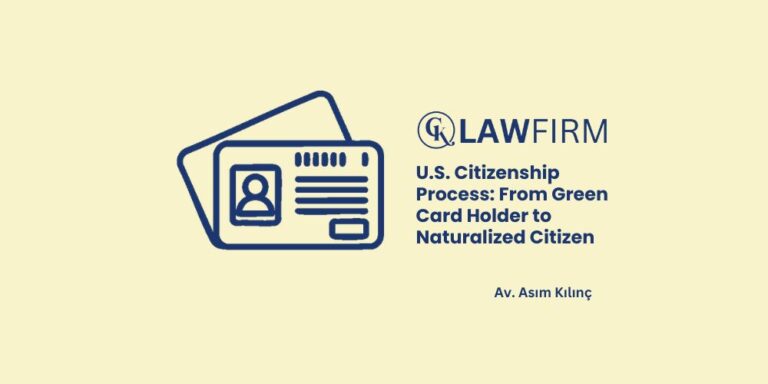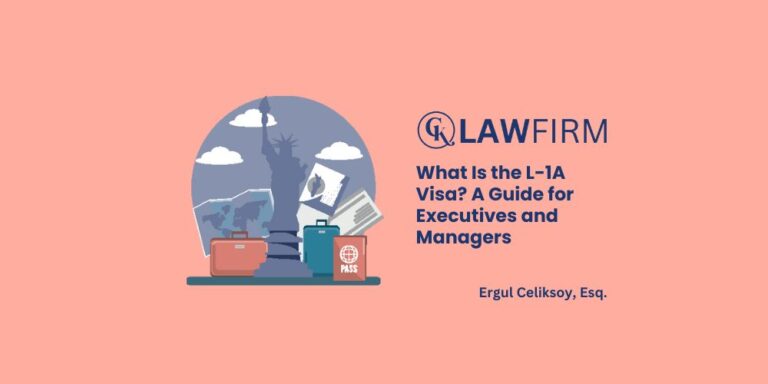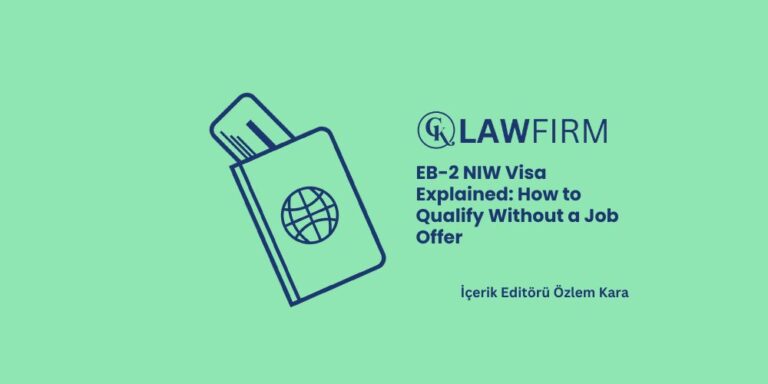Schedule an Appointment with Our Attorneys Now

Being Subject to a Security Clearance: Process, Reasons, and Key Considerations
Learn about U.S. Security Clearance: what it is, why it's needed, and how it affects your visa or immigration process.
By Ergul Celiksoy, Immigration Attorney at CK Law Firm
A security clearance is a process conducted to review the background of individuals applying for immigration or a visa to the United States. The U.S. government conducts this investigation to ensure national security and prevent the entry of individuals who may have the potential to engage in illegal activities.
- What Is a U.S. Security Clearance and Why Is It Conducted?
- Which Applications Are Subject to Security Clearance?
- What Does It Mean to Be Subject to a Security Clearance?
- Why Are Applicants Subject to a Security Clearance?
- What Happens During the Security Clearance Process?
- What Should You Do If You Are Subject to a Security Clearance?
- How Long Does It Take for the Security Clearance to Be Concluded?
- What Are the Outcomes of a Security Clearance?
If you have any further questions about this topic, don’t hesitate to leave a comment below, message me directly on LinkedIn, or reach out to me via the CK Law Firm Immigration Law Office website, where I am a co-founder!i
What Is a U.S. Security Clearance and Why Is It Conducted?
A U.S. security clearance is a process where the backgrounds of applicants are carefully scrutinized before they enter the United States. The purpose of this clearance is to protect U.S. national security and ensure that individuals entering the country do not pose a security risk. During the immigration process, the background of applicants is reviewed to assess any potential links to terrorism, criminal history, or involvement in illegal activities. This is part of the U.S. policy to safeguard both international agreements and domestic security.
Which Applications Are Subject to Security Clearance?
Security clearance may apply to those seeking to enter the U.S. on various visas or through immigration status. The main categories include:
- Visa Applications: Everyone applying for non-immigrant visas (such as tourist, student, or work visas) or immigrant visas (such as Green Card applications) is subject to a security clearance.
- Green Card Applications: Those applying for permanent residency (Green Card) undergo a thorough security clearance process.
- Citizenship Applications: The backgrounds of those applying for U.S. citizenship are thoroughly reviewed to detect any crimes committed during their stay in the U.S. or any activities that might pose a threat to the country’s security.
- Work Visas: Applicants for employer-sponsored visas such as H-1B, L-1, and O-1 are subject to security clearance. Their professional background and activities in the U.S. are also reviewed.
- Refugee and Asylum Applications: Security checks are conducted meticulously for those seeking asylum or refugee status in the U.S., ensuring the accuracy of the information provided by the applicant within the framework of intergovernmental security agreements.
What Does It Mean to Be Subject to a Security Clearance?
Being subject to a security clearance means that further investigation is required regarding an individual’s background during their visa, Green Card, or citizenship application. If there are suspicious activities, criminal records, or violations of immigration rules in the applicant’s history, the approval process may be delayed. In this case, a thorough investigation will be conducted to assess whether the application poses a security risk.
Why Are Applicants Subject to a Security Clearance?
Several factors can trigger a security clearance for an applicant, including:
- Criminal Records: Past crimes, especially violent offenses, fraud, or drug trafficking, can trigger a security clearance.
- Terrorism Links: Any connection to terrorist organizations can raise suspicion and lead to a security clearance.
- Immigration Violations: Individuals who have previously overstayed in the U.S., violated visa conditions, or used false documents in their applications may face security clearance.
- Military or Security Work: Applicants who have worked in the military or security sectors in their home country may require additional investigation, as the U.S. government may want to review their ties to other governments.
- Political or Religious Views: In some cases, an individual’s political or religious views may cause the government to examine the application more closely, especially if there are suspicions of involvement with radical or extremist movements.
What Happens During the Security Clearance Process?
When an application is flagged for security clearance, the processing time may be extended. Several federal agencies (such as the FBI, CIA, and DHS) conduct a comprehensive review of the applicant’s background. The process involves the following steps:
- Database Checks: The U.S. government scans the applicant’s name in various national and international databases. These checks may reveal criminal records, travel history, financial transactions, and connections to terrorist organizations.
- Interview and Additional Documents Request: In some cases, the applicant may be asked to provide additional documents or attend an in-person interview at the U.S. consulate. The interview is designed to clarify the applicant’s background and verify the information provided.
- In-Depth Investigations: If the applicant poses a security risk, a more comprehensive investigation may be launched, potentially extending the time for the application to be processed.
What Should You Do If You Are Subject to a Security Clearance?
Being subject to a security clearance is a common situation for applicants. Here are some important steps to take:
- Be Patient: The security clearance process can take time. Applicants should remain patient and regularly check the status of their applications.
- Submit All Documents Accurately: Providing all documents accurately and completely at the time of application can help speed up the process. It is crucial to avoid submitting false information or documents, as this can not only delay the process but also result in the rejection of the application.
- Provide Additional Information Quickly: If the U.S. government requests additional information, providing it quickly and accurately can help expedite the process. Applicants should submit the requested documents as soon as possible.
How Long Does It Take for the Security Clearance to Be Concluded?
The time it takes to conclude a security clearance varies depending on the applicant’s background, the documents submitted, and other factors. Typically, a security clearance can be completed within a few weeks to several months. However, if there are issues or suspicious circumstances in the applicant’s history, the process can be extended for months.
Common situations and average processing times include:
- Routine Applications: These are generally resolved within a few weeks to 2-3 months. These applications require no additional scrutiny, and the applicant’s background is clean.
- Additional Security Reviews: If the applicant has a criminal record, international travel history, or connections to U.S. security agencies, the review process can take 6 months or more. This is common for applications from countries considered high security risks.
- Refugee or Asylum Applications: Security clearance for these applications can take more than six months, depending on the applicant’s country and background. A thorough international review of the individual’s history is conducted.
What Are the Outcomes of a Security Clearance?
A security clearance can result in three possible outcomes:
- Approval: If the applicant is found to pose no threat, the application is approved, and a visa or Green Card is issued.
- Denial: If the applicant poses a security risk or has a criminal record, the application may be denied, preventing the individual from entering the U.S.
- Additional Review: In some cases, the applicant’s situation may require further investigation, which can prolong the application process.
Conclusion
Being subject to a security clearance is a common situation in U.S. immigration applications. Applicants should remain patient, provide accurate information, and seek assistance from an immigration attorney. At CK Law Firm, we provide the necessary legal support to applicants during the security clearance process. Seeking professional help is always the best approach to speeding up the process and ensuring a smooth application.
For professional support, detailed information, and consultation services, you can contact us via cklawfirm.org, info@cklawfirm.org, or connect with us on LinkedIn.
Who is Attorney Ergül Çeliksoy?
Attorney Dr. Ergül Çeliksoy is a founding partner of CK Law Firm and also serves as an Assistant Professor of Law at the University of Nottingham. With extensive experience in U.S. immigration law, Dr. Çeliksoy completed a Master’s degree in international law and human rights law at the University of Nottingham in 2017, followed by a Ph.D. at the same university. His Ph.D., completed in 2022 at the University of Nottingham School of Law, marked a significant milestone in his academic career. Dr. Çeliksoy has published extensively in leading academic journals and is internationally recognized for his expertise in modern slavery, criminal justice, and criminal law. As a member of the California Bar, Dr. Çeliksoy offers exceptional service to his clients, particularly in U.S. immigration law cases. His expertise and experience in immigration law significantly contribute to CK Law Firm’s work in this area.
Dr. Çeliksoy provides comprehensive and strategic solutions to his clients in immigration law cases, helping secure their legal status in the U.S. His work on human rights and immigration processes, particularly in modern slavery and criminal law, effectively addresses the complex legal issues immigrants face. Dr. Çeliksoy reinforces CK Law Firm’s leadership in immigration law by offering reliable and effective legal consulting services to his clients, helping them build new lives in the United States.





